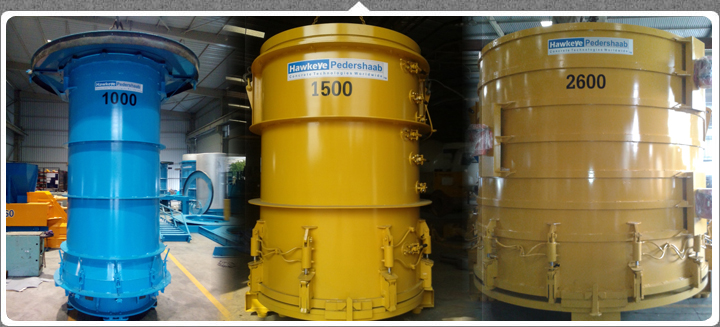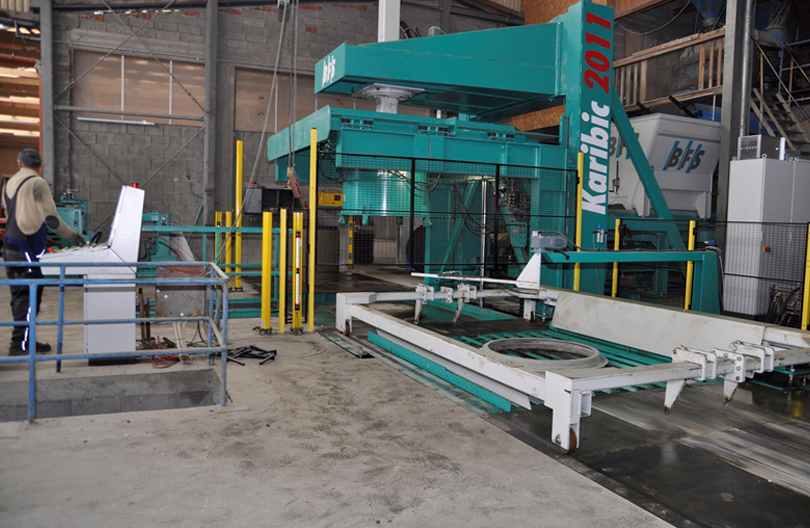
KARIBIC’s state-of-the-art production line for manhole rings, necks, and bases is a model of modern engineering. With a focus on automation, this facility efficiently turns raw materials into high-quality, durable products designed for long-term use in infrastructure projects. This article will provide a detailed step-by-step explanation of how KARIBIC's fully automatic production line creates manhole rings and necks up to 1500 mm in diameter, manhole bases up to 1200 mm, and road and yard gullies.
Understanding the Production Line
KARIBIC’s production process is highly automated, which allows the company to maintain consistent product quality, improve efficiency, and reduce manual labor. The production line is designed to manufacture various products, including manhole rings, necks, and bases, as well as road and yard gullies, with diameters ranging from 1200 mm to 1500 mm. The automation involved ensures that each product is created with precision and to the highest standards.
Step 1: Sourcing Raw Materials
The first step in KARIBIC’s production process is sourcing high-quality raw materials. The main ingredients used in the production of manhole rings and necks are aggregates, cement, water, and additives. These materials need to meet specific standards to ensure the final product has the strength and durability required for its use in civil engineering projects. The quality of these raw materials directly impacts the longevity and safety of the finished product.
Step 2: Material Preparation
Once the raw materials have been sourced, they go through a preparation process. This involves cleaning, sorting, and grading the aggregates to ensure they are free from contaminants and meet the size requirements for concrete production. KARIBIC uses an automated system to handle these materials, minimizing human error and ensuring uniformity in the product.
Step 3: Precision Mixing and Batch Preparation
Next comes the precision mixing of these raw materials to create the concrete mix. The production line uses fully automated batching systems that ensure each batch of concrete is consistent in its composition. This consistency is critical, as even minor variations in the mix can affect the quality of the final product. The concrete mixture is designed to provide the ideal balance of strength, workability, and durability.
Step 4: Mold Preparation
Before the concrete can be cast, molds must be prepared. KARIBIC utilizes different types of molds depending on the specific product being produced. For example, the molds for manhole rings are cylindrical, while those for bases and gullies are more complex. Each mold is cleaned and prepped to ensure that the concrete sets to the precise dimensions required. The molds are then coated with release agents to make sure the finished products can be easily removed without damaging the surfaces.
Step 5: Automatic Casting of Manhole Rings and Necks
One of the highlights of KARIBIC’s production line is the fully automatic casting process. Once the concrete mix is ready and the molds are prepared, the system casts the manhole rings, necks, and bases with minimal human intervention. This automated process ensures that each product is cast to exact specifications, ensuring uniformity across the board. The use of automation also significantly reduces production time, allowing KARIBIC machine to manufacture large quantities efficiently.

Step 6: Vibrating and Compacting the Concrete
After the concrete has been poured into the molds, the next step is vibrating and compacting. This is crucial for eliminating air pockets that can weaken the structure of the finished product. KARIBIC’s automated vibrating systems ensure that the concrete is evenly distributed within the mold, compacting it to achieve maximum strength and durability. Proper compaction also improves the surface finish of the product, making it smoother and more resistant to wear.
Step 7: Curing the Concrete Products
Curing is a vital part of the production process, as it allows the concrete to harden and reach its full strength. KARIBIC employs both traditional and accelerated curing methods depending on the product being manufactured. In some cases, the products are placed in temperature-controlled environments to speed up the curing process, while in others, natural curing over a longer period is used. This ensures that the manhole rings and necks are ready for use in a variety of environmental conditions.
Step 8: Quality Control and Inspection
KARIBIC places a strong emphasis on quality control throughout the entire production process. After curing, each product undergoes a rigorous inspection to check for any defects or imperfections. The products are tested for both their dimensional accuracy and their structural integrity. This involves checking the product’s strength, surface finish, and ensuring it meets the specific requirements for its intended application.
Step 9: Finishing and Surface Treatment
Once the manhole rings and necks pass inspection, they undergo final finishing and surface treatment processes. This step may involve smoothing out the surface to eliminate any rough spots and applying treatments that enhance the durability and longevity of the product. Some products may receive additional coatings to make them more resistant to environmental factors such as moisture and corrosion.
Step 10: Automatic Handling and Stacking
KARIBIC's fully automated system extends to the handling and stacking of the finished products. After finishing, robotic arms and automated conveyor systems transport the manhole rings, necks, and bases to the storage area, where they are stacked securely. This reduces the need for manual labor and ensures that the products are handled with care, minimizing the risk of damage.
Step 11: Packaging and Dispatchs
Once the products have been stacked, they are packaged for delivery. KARIBIC uses specialized packaging methods to protect the products during transport. Each batch is carefully labeled and tracked to ensure efficient dispatch and timely delivery to customers.
Conclusion
KARIBIC’s fully automated production line for manhole rings, necks, bases, and gullies exemplifies modern manufacturing techniques. From the precise selection and mixing of raw materials to the final dispatch, every step is carefully controlled to ensure high-quality, durable products. This efficiency, combined with stringent quality control, makes KARIBIC a leader in the industry.
FAQs - KARIBIC’s Manhole Ring
The entire production process, including curing, typically takes around 24 to 48 hours depending on the product type and curing method used.
KARIBIC can produce manhole rings and necks with diameters of up to 1500 mm and manhole bases up to 1200 mm.
Through stringent quality control measures, including strength testing, proper curing, and surface treatments that enhance resistance to wear and environmental factors.
Automation ensures consistency, precision, faster production times, and ultimately, more cost-effective products.
Yes, KARIBIC strives to use sustainable practices, including recycling materials and minimizing waste throughout the production process.
Recent Articles
- Precast Concrete Box Culvert for Urban Underpasses and Cable Trenches
- How Concrete Pipe Machines Crucial in Power Plant Infrastructure?
- Role of Concrete Pipe Machines in Canal Lining Projects
- How Drycast Technology is Changing the Concrete Pipe Industry?
- Common Mistakes to Avoid When Selecting Pipe Moulds for Your Machine





 BACK TO ARTICLES
BACK TO ARTICLES